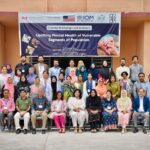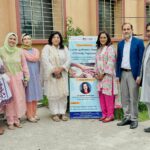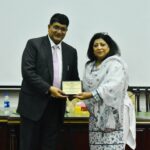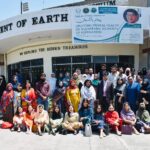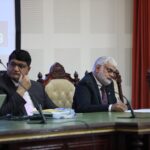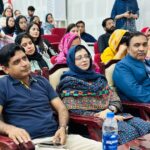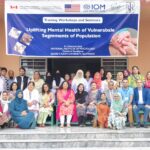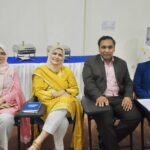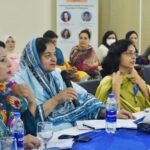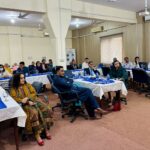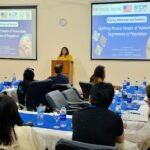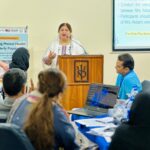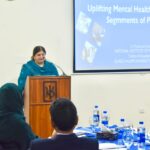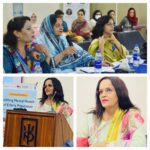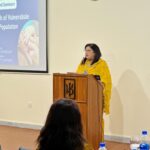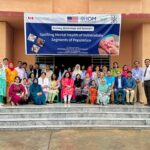National Institute of Psychology, Quaid-i-Azam University, Islamabad
Dr. Muhammad Ajmal
Centre of Excellence, Quaid-i-Azam University, Islamabad
2-Day Training Workshop on
Uplifting Mental Health of Elderly
2-3 May, 2024
The National Institute of Psychology, in collaboration with the International Organization for Migration (IOM), conducted a dynamic 2-day training workshop titled “Uplifting Mental Health of Elderly” on May 2-3, 2024. Renowned expert Dr. Kaneez Fatima Shad, a distinguished professor of Neuroscience and Translational Clinical Researcher from Sydney, Australia, led the workshop as the resource person; while Dr. Naeem Aslam and Dr. Aisha Zubair Assistant Professors at NIP contributed developing insights into indigenous issues of elderly individuals. Mental health care practitioners and healthcare providers from various public and private sector organizations in Pakistan participated in the workshop. Delving into the intricate realm of elderly mental health, the workshop delivered immersive knowledge and awareness on prevalent neurological and psychological issues. Dr. Shad assembled vital expertise in identifying and alleviating instances of neglect, trauma, violence, and abuse, equipped with customized screening and intervention techniques tailored to the unique needs of elderly. Immersive activities like lectures, group discussions, role-playing, and case studies intensified the learning journey. With a diverse audience comprising healthcare professionals and mental health and psychosocial support, the workshop fostered meaningful exchanges and collaborative learning opportunities in identifying elderly mental health challenges and implementing effective well-being strategies. Overall, it served as a valuable platform provided under the visionary leadership of Prof. Dr. Rubina Hanif, director National Institute of Psychology for enhancing awareness, knowledge, and skills related to uplifting the mental health of the elderly population.
Seminar on
Uplifting Mental Health of
Vulnerable Segments of Population in Pakistan
2nd May, 2024
On May 2nd, 2024, the National Institute of Psychology (NIP), Quaid-i-Azam University, Islamabad, in collaboration with Pegham-e-Pakistan hosted a seminar titled “Uplifting Mental Health of Vulnerable Segments of Population in Pakistan,” under their project sponsored by IOM. Prof. Dr. Rubina Hanif (Director NIP) welcomed Prof. Dr. Muhammad Zia Ul Haq (Director General, Islamic Research Institute, International Islamic University, Islamabad) as the distinguished resource person of the talk. He reflected upon mental health outcomes in context of gender-based violence and sufferings of children, elderly, and people living in deprived condition. He shared thoughts with wealth of expertise in Comparative Fiqh, a commendable record of academic leadership, and peace-building initiatives. The seminar drew participation from 281 attendees from Fraternity of Psychology representing various esteemed institutions in Islamabad and Rawalpindi, including the Directorate Federal Board of Colleges, ICT colleges, Bahria University, Islamic International University, Foundation University, National University of Modern Languages, Rawalpindi Women University, and SZABIST. The esteemed presence of Professor Dr. Shafique Ur Rehman, Registrar of QAU, added further significance to the event. The key objectives of the Seminar were: (1) Raise awareness and Increase Understanding of participants about the unique mental health challenges faced by vulnerable segments of the Pakistani population, including women, children and adolescents, elderly, and marginalized communities living in deprived conditions. (2) Promote inclusivity and foster dialogue among stakeholders and service providers specifically from psychology background. (3) Identifying social, cultural, economic, and systemic barriers hindering access to mental health services for vulnerable populations, with a focus on exploring potential solutions to overcome these obstacles. Dr. Zia-ul-Haq particularly invited all participants to do focused research to find reasons for violence against women and children and find solutions to address the problem. He emphasized promoting stigma reduction and mental health literacy at both individual and societal levels. The seminar was moderated by Ms. Noreeta Suleman (Lecturer cum Research Associate). Participants showed keen interest in the talk and asked many questions and shared their views. This seminar provided a platform for meaningful dialogue, knowledge exchange, and collaboration aimed at enhancing mental health outcomes for vulnerable segments of the Pakistani population. Through shared insights and collective efforts, participants reaffirmed their commitment to creating a more inclusive and equitable society where mental health is prioritized for all.
2-Days Training Workshop on
Uplifting Mental Health of Elderly
26-27, April 2024
National Institute of Psychology has organized 2-day training workshop “Uplifting Mental Health of Elderly” in collaboration with IOM on 26-27, April 2024 as part of a project “Uplifting Mental Health of Vulnerable Segments of Population”. Dr. Kaneez Fatima Shad, Professor of Neuroscience and Translational Clinical Researcher Sydney, Australia was the resource person. Participants were professional health care providers including doctors and nurses, mental health professionals (counselors, therapists and social workers) rendering their services in public and private sector organizations of Pakistan. Prof. Dr. Rubina Hanif, Director NIP briefed the participants about core objectives and functioning of NIP and also shared major layout of the project and its broader utility in context of healthcare provision. There were six technical sessions spanned in two days activities focusing on orienting the participants about major mental health challenges faced by elderly individuals in our society, as well as cognitive decline and neurological deficit which are predominantly part of process of aging. In lieu to it the further deliberations emphasized identification of trauma, violence and abuse among elderly. In addition, participants were equipped with pragmatic learning of screening and diagnostic tools for elderly, intervention, strategies and therapeutic skills that can be used with elderly. The major key takeaways and corresponding action plan were generated in terms of meaningful social activities for elderly to uplift and enhance their mental health and improving their quality of life.


